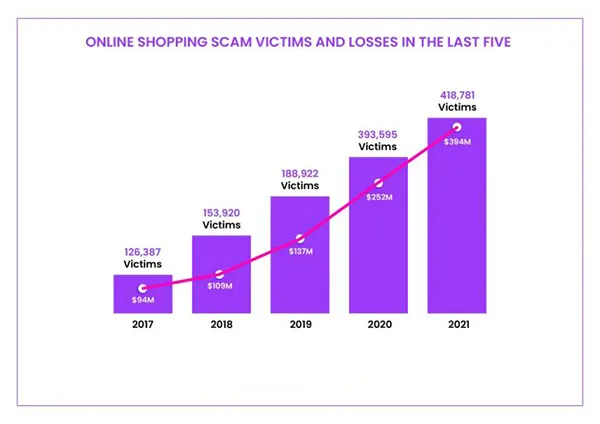The official start of the holiday shopping season is on Black Friday. It is a great time to buy items at discounted prices. However, you need to be aware of some associated risks. Black Friday fraud has become quite prevalent among shoppers as well as scammers.
According to a PissedConsumer Black Friday survey, 41.3% of customers plan to shop from a website or an app, and only 12.1% – in-store. It means that customers have increased chances to fall victim to online special discounted hoaxes.
Let’s look at some of the most common Black Friday scams that you should be aware of and how to avoid them.
Common Black Friday Scams and How to Avoid Them
Phishing Scams
The main goal of a phishing scam is for the attacker to acquire your personal and financial information. Commonly, scammers use bait, typically a seemingly legit email with a compelling discount.
The electronic mail directs you to an attacker-controlled website where they intercept your information such as name, credit card number, social security number, or account password.
The link may also contain spyware or malware embedded into your device to collect your personal and financial information.
The Black Friday survey established that 25.7% of customers find out about discounted deals through electronic mail. As such, many customers are unsuspecting of suspicious promotion emails, easily falling for phishing hoaxes.
To avoid phishing scams:
- Do not open any unsolicited emails or texts.
- Do not open suspicious links. Hover your mouse cursor over links in the correspondence to see the destination URL. Don’t open dubious links that do not match the organization’s official website.
- Do not download attachments from suspicious or unsolicited emails.
- Set up two-step authentication for your online financial accounts.
- Do not provide your financial and personal information in response to unsolicited requests.
FUN FACT
In the 1800s, Black Friday was a term used to indicate stock market crashes, and it was officially adopted as a shopping day in 2001.
Fake Amazon Order Scams
Amazon is one of the most well-known marketplaces for consumers to do their Black Friday shopping. As such, scammers are keen to target their shoppers. Their most common strategy is spoofed Amazon order notification emails.
The hackers have become so smart at it that you can hardly tell that the electronic mail is spoofed.
You receive a seemingly legitimate delivery shipment confirmation, and, in some cases, when you click on the link provided, it sends you to the actual Amazon account.
However, the catch is that the fake profiles provide you with a phone number to call to follow up on your dispatch issues. This is not a legitimate Amazon customer service number.
When you call the number, no one will answer. The hackers then call you back after a few hours and ask you to provide your credit card and CVV numbers to cancel the order.
To avoid Fake Amazon order scams:
- Check the sender’s email address before clicking on any link or calling the number provided. Legit Amazon emails come from an address ending with @amazon.com, @amazon.co.uk, or other Amazon official websites.
- Study carefully the email subject line. Legit correspondence has clear and concise subject lines. Be wary if they are lengthy and have excessive punctuation marks and symbols.
- Look out for the Amazon logo and branding. Genuine electronic mail includes the company’s official logo and other branding elements.
- Confirm order details in your Amazon account. If there are issues with your shipment, contact Amazon customer service from within your account.
Non-Delivery Scams
Another rampant type of internet fraud is non-delivery fake shopping deals. You purchase advertised or listed items on a given website or marketplace and then proceed to checkout.
However, the items are never delivered. Any attempts to reach the company’s customer service team to follow up on your shipment are often futile.
To avoid non-delivery scams:
- Research a prospective seller, website, or digital marketplace before making your order. Check the legitimacy of the company on review websites. Be wary of companies that have no or few virtual reviews. If the business has too many negative reviews, it may also be a red flag.
- Check for scam alerts on the internet for the seller or marketplace by searching on Google “seller’s name+scam.”
Take a look at the graph below, which is an eye-opening fact that online shopping scams have constantly risen from 2017 to 2021.
The pandemic lockdown hasn’t deterred the confidence of scammers, but in fact, aggravated it. There is even more requirement for a robust technology that can provide secure payment options to the customers.

Counterfeit Products
During the Black Friday shopping rush, hackers sell fake versions of trendy products at reduced prices to trick shoppers.
However, when the items are delivered, you realize that they are different from the original, or they get easily damaged.
To avoid counterfeit product scams:
- Do not buy items that are sold at significantly lower prices than their original counterparts.
- Carefully read the product description and check for discrepancies with the original products.
- Stay away from sellers without contact information or whose websites look fake.
Social Media Scams
These are fake internet discounted deals advertised on social media. You may encounter an irresistible special deal advertisement or a social media posting. Some hackers send the link directly to you as a private message.
However, as in the case of phishing, the link leads to a fake website where the scammers collect your personal and financial information. Or the link may contain malware or spyware.
To avoid social media scams:
- Do not open any Black Friday deals sent directly.
- Beware of too-good-to-be-true Black Friday offers.
Although seasonal festivals are a great time to shop for various items at discounted prices, stay vigilant of the rampant online shopping frauds associated with them.
Only shop from reputable websites and marketplaces. Ignore unsolicited emails, text messages, or social media private messages with too-good-to-be-true Black Friday Deals.






